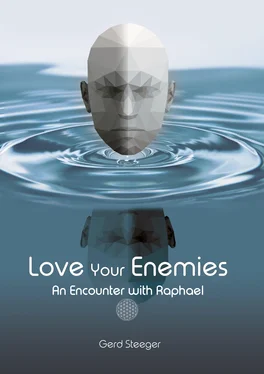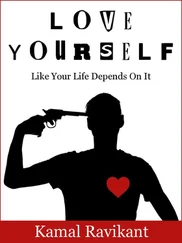Flight attendants are trained to behave professionally in such dangerous situations; to hide their own fears, in order not to further unsettle their passengers. Nevertheless, flight attendants are intelligent people who are fully aware of the hazardous situation and merely suppress and better control their own growing emotions. Even people who believe in life after death, or who have perhaps seen or experienced evidence/indications of life after death, are not free of fear. Their own ego, as part of their body, nearly always wants to live on. My thoughts were also with the perpetrator, the co-pilot. What motivated this man to take his own life, in a way in which he arbitrarily decided to plunge 149 other people to their deaths with him?
The next thought that came to my mind was: Can one really, unconditionally believe everything that the mainstream media tells us, is "true?" Perhaps this report is just as "true" as the coverage of an alleged pilot failure on Inter-Air Flight 148, which occurred on January 20, 1992 in Strasbourg. It was claimed that both experienced pilots were completely overtaxed and did not fully master the relatively new Airbus A320 aircraft type in this situation. Shortly before landing, the plane collided with a mountain and 87 passengers lost their lives. A disastrous rescue mission cost even more lives. To this day, it is still unclear why the plane crashed and why the rescue mission had been so extremely amateurish.
The black box, is allegedly capable of surviving enormous heat and pressure, yet - according to official reports – it was completely destroyed by the heat and could therefore not be analysed.
A little dickybird told me, that it could have happened very differently: Every airplane has a sensor that indicates the height above ground level. This sensor gave false values to the pilots, which meant that they assumed they were at a higher altitude than they were in reality. When the pilots noticed this error, due to better visibility, they gave full thrust and used the joystick to pull the aircraft up to a higher altitude. Unfortunately, the software was designed to avoid aircraft stress or a possible stall and prevented this climb. The software that was supposed to support the pilots, overruled the experienced pilots and that sealed their fate. If the black box had been evaluated and the results officially announced, the then relatively new Airbus shares would have dropped in free fall.
Why did they risk that possible survivors would freeze to death? There was a risk that if one of the pilots had survived, he could have explained what happened? Are the interests of a large company, and in this case, even of a state, more important to media coverage than telling people the truth? Can it be completely ruled out that the mainstream media had not sold their souls to lobbyists, just like in Goethe's Faust?
I decided to turn off the television and let the impressions have an effect on me during a walk. I opened the front door to leave my apartment, while completely lost in thought, and just before the door finally fell to, I just managed to put my foot in the door to prevent it from shutting me out. Not only was my front door key not in my pocket, but it was still in the lock on the inside of the apartment. It would have been expensive to re-enter my own apartment, with the help of a locksmith. The shock was still with me for some time, even after I had already left my apartment – carefully this time. My way led me past the letterboxes, which in this building were located in a block on the ground floor. I emptied my letterbox in order to quickly find out if an important letter had arrived. The long-awaited, important letter was to be found amongst some other letters. Full of expectation and hope, I opened it and read the first lines: "We read your letter with interest, but we have to tell you that with regret......".
The Old Man and the Horse
What else could you expect, from a day like this, I thought? Would it be better to sleep through the day and wait for another, better day, or should one look at this supposedly bad news without regard to its value, as one knows from the story about the old man and the horse that the Chinese philosopher Lao-Tze liked to tell.
You don't know that story, dear reader? Then I do not want to withhold the story from you:
An old, very poor man lived in a village, yet even kings were jealous of him as he owned a beautiful white horse. Kings offered fantastic sums for the horse, but the man then said: "For me this horse is not a horse, but a man, and how could one sell a man, a friend? The man was poor, but he never sold his horse. One morning, his horse was not in the stable. The whole village gathered and the people said, "You, stupid old man! We always knew that one day the horse would be stolen. It would have been better to sell it. What a misfortune! The old man said: "Don't go so far as to say that. Just say: The horse is not in the stable. That much is a fact: Everything else is opinion. Whether it is a misfortune or a blessing, I do not know, because this is only a fragment. Who knows what will follow? People laughed at the old man. They had always known that he was a little crazy.
But one evening, fifteen days later, the horse suddenly returned. It had not been stolen, but had broken out into the wilderness. And not only that, it also brought a dozen wild horses with it. Again, the people gathered and they said: Old man, you were right. It wasn't misfortune, it actually proved to be a blessing. The old man replied: "Again you are going too far. Just say: The horse is back. Who knows whether this is a blessing or not? It is only a fragment. If you read only one word in one sentence, how can you judge the whole book? This time people didn't know what else to say, but inside they knew that the old man was wrong. Twelve magnificent horses had arrived.
The old man’s only one son, began to train the wild horses. A week later he fell off the horse and broke both his legs. Again, the people gathered, and made their judgment. They said: “Again, you got it wrong! It was an accident. Your only son can't use his legs anymore, and he was the only one to support you, in your old age. Now you are poorer than ever.” The old man replied: “You are obsessed with making judgments. Don't go so far. Just say that my son has broken his legs. No one knows whether this is a misfortune or a blessing. Life comes in fragments, and that's all you get to see.”
It turned out that a few weeks later, the country started a war. All the young men from the village were forcibly drafted into the military. Only the old man’s son was left behind as he was crippled. The whole village was filled with lamentations and cries of pain, because this war could not be won and it was known that most of the young men would not return home. They came to the old man and said: "You were right, old man - it proved to be a blessing. Your son may be crippled, but he is still with you. Our sons are gone forever. The old man answered again: "You do not stop judging. Nobody knows! Say only this: That your sons were drafted into the army and that my son was not drafted. But only God knows whether this is a blessing or a misfortune.”
I left the residential area, wearing a T-shirt and crossed the street, in order to be able to later reach the beach promenade, from the other side of the street. At over 25°C, it was unusually warm for the month of March. After a pleasant walk, the beach lay directly before me.
The light brown sandy beach stretched out in front of me, which was sparsely used, as the water was still quite cold and you very rarely see people bathing in the sea, at this time of the year. Only the toughest tourists, probably from the Scottish Highlands or Iceland, spend their nice holidays, here. The colour of the water was blue/grey and changed to a light blue on the horizon, which in turn led to a deep blue sky.
Читать дальше












